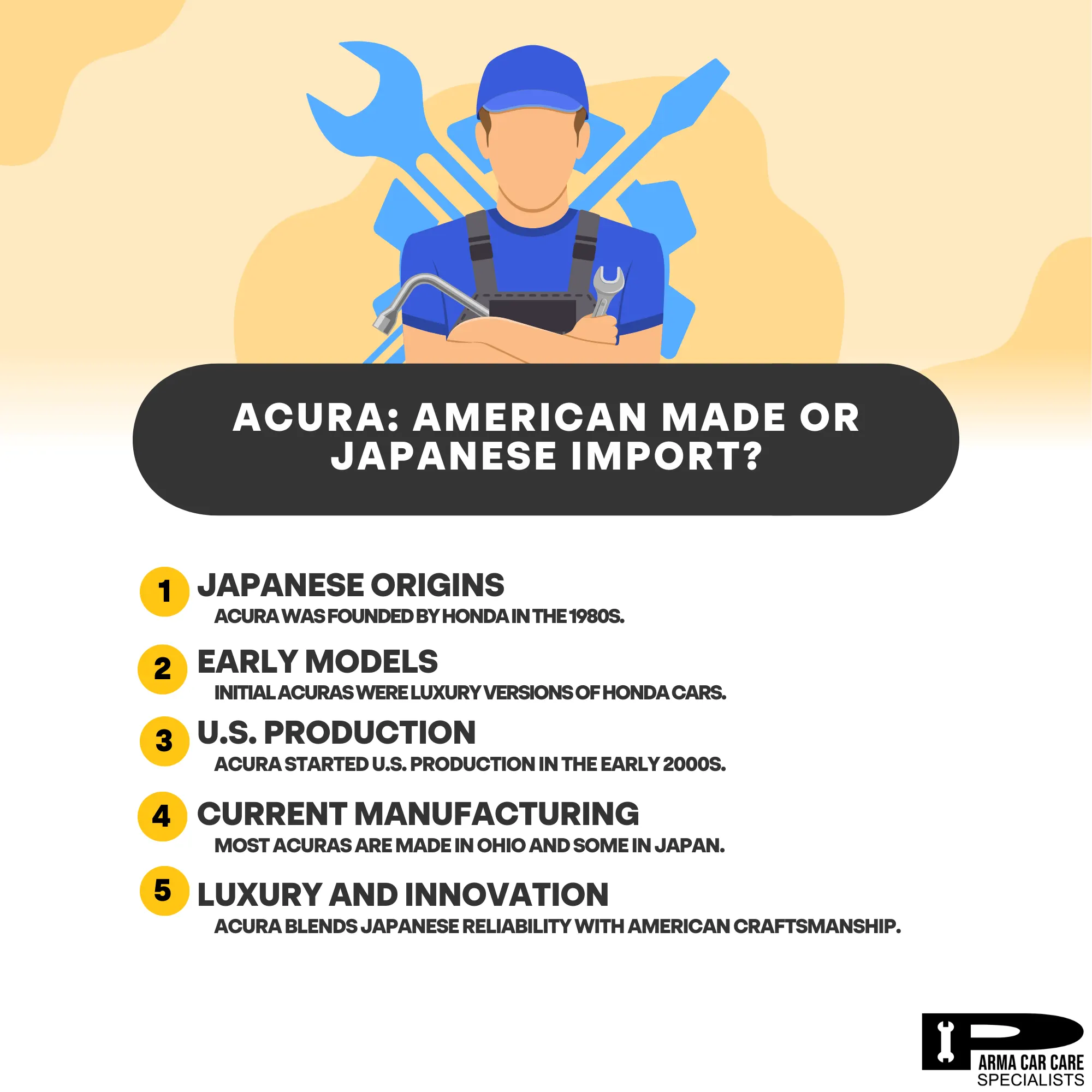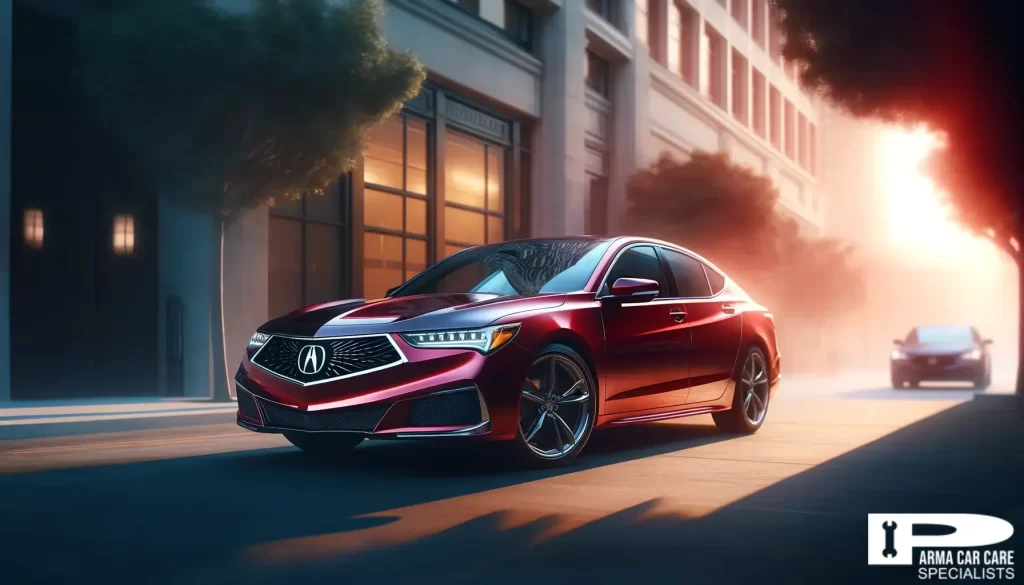Have you ever cruised down the highway in a sleek Acura, wondering where this luxurious machine originated? Acura, a name synonymous with refined performance and technological innovation, might leave you surprised by its heritage. While it carves a niche in the American luxury car market, its roots lie firmly in the rich automotive landscape of Japan.
Acura’s Origins: A Honda Story
Acura’s story begins in the fertile minds of Honda executives in the mid-1980s. As Honda, a brand renowned for its reliable and practical vehicles, sought to establish a foothold in the burgeoning American luxury car segment, Acura was born. Launched in 1986, Acura aimed to compete with established European brands like BMW and Mercedes-Benz by offering vehicles that boasted superior performance, premium features, and unparalleled reliability – all at a competitive price point.
Early Acura Models: A Blend of Japan and America
In its initial foray into the luxury market, Acura adopted a strategic approach – rebadging existing Honda models with a touch of luxury. Early Acura staples like the Legend (a gussied-up version of the Accord) and the Integra (a sportier iteration of the Civic) exemplified this strategy. Rebadging, a common practice in the automotive industry, essentially involves taking an existing car platform and outfitting it with more upscale features, a unique design language, and a distinct brand identity. This approach allowed Acura to capitalize on Honda’s proven engineering prowess and established production lines while simultaneously creating a differentiated product for the luxury market.
A Shift Towards American Production
As Acura carved its niche in the American market, a pivotal shift occurred in the early 2000s. The brand made a strategic decision to move production of its vehicles to the United States. Several factors drove this move. Firstly, it allowed Acura to circumvent hefty import tariffs that could have inflated the price of its vehicles for American consumers. Secondly, establishing production facilities within the U.S. enabled Acura to cater more effectively to American tastes and preferences. The first American-made Acura, the popular MDX SUV, rolled off the production line in 2001, marking a significant milestone for the brand.
Where are Acuras Made Today?
Today, Acura’s production footprint in the U.S. is substantial. The East Liberty Auto Plant in Ohio is the primary manufacturing hub, churning out popular models like the RDX and the MDX. The Marysville Auto Plant produces the Acura TLX sedan in the same state. These facilities utilize American labor and expertise to uphold top-quality standards. While Acura’s focus has shifted towards U.S. production, a small handful of models, like the high-performance NSX supercar, are still manufactured in Japan, leveraging Honda’s expertise in crafting high-caliber sports cars.
Benefits of American-Made Acuras
The decision to manufacture Acuras in the U.S. offers a multitude of advantages for American consumers:
- It contributes to job creation within the American automotive industry.
- It bolsters the local economy by stimulating the supply chain and related industries.
- U.S. production can potentially lead to cost savings that translate into more competitive pricing for Acura vehicles.
- American-made Acuras benefit from stringent quality control measures implemented by Acura within its U.S. facilities, ensuring that each vehicle meets the brand’s exacting standards.
Are There Still Japanese-Made Acuras?
As mentioned earlier, a limited number of Acura models are still produced in Japan. This strategic decision allows Acura to leverage Honda’s expertise in specific areas, such as high-performance car manufacturing. However, the vast majority of Acura models sold in the U.S. are now American-made. This shift in production strategy has not significantly impacted Acura’s brand identity. Acura continues to be recognized for its blend of Japanese engineering excellence and American design sensibilities, creating a truly unique and compelling offering in the luxury car market.
Acura vs. Lexus and Infiniti: A Battle of Origins
Acura’s story is familiar among Japanese luxury car brands. Lexus, the brainchild of Toyota, and Infiniti, a subsidiary of Nissan, share similar origin stories. All three brands were established in the 1980s with the aim of capturing a slice of the lucrative American luxury car market. While all three leverage their parent companies’ engineering prowess, there are subtle differences in production strategies. Lexus, for instance, has maintained a higher percentage of Japanese-made vehicles compared to Acura and Infiniti. This might influence brand perception to a certain extent, with Lexus perhaps seen as retaining a more “exotic” aura due to its Japanese roots. However, all three brands prioritize quality, performance, and innovation, ultimately offering consumers a compelling choice within the luxury car segment.
Does It Matter?
The importance of a car’s origin can be a topic of debate among car enthusiasts. For some, a car’s pedigree holds significant weight. They might be drawn to the heritage and craftsmanship associated with a particular country’s automotive industry. For others, however, the origin is secondary. These buyers prioritize factors like performance, technology features, safety ratings, and overall value proposition.
Ultimately, the decision of whether a car’s origin matters boils down to individual priorities. Key factors that typically influence car buying decisions include:
- Quality and Reliability: A long-standing reputation for quality and reliability is a significant selling point for many car brands, regardless of origin. Acura, for instance, benefits from its association with Honda’s well-deserved reputation for dependable vehicles.
- Performance: Performance expectations vary depending on the car segment. For luxury car buyers, a balance of exhilarating power, smooth handling, and a comfortable ride is often paramount. Acura consistently delivers on this expectation, thanks to its focus on innovative engine technologies and precision engineering.
- Brand Image: Luxury car brands cultivate a specific image that resonates with their target audience. Acura’s brand image is one of refined sophistication, technological prowess, and a commitment to the driving experience. This image transcends its origin and appeals to a broad spectrum of luxury car buyers.
- Value Proposition: When considering value, car buyers weigh the price of the vehicle against the features, performance, and overall ownership experience it offers. Acura strikes a compelling balance between luxury features and a competitive price point, providing excellent value for discerning buyers.
Beyond the Label: What Makes Acura Special?
Acura’s appeal extends far beyond its geographical origins. The brand has carved its niche in the luxury car market by focusing on several key areas:
- Performance-Focused Engineering: From the exhilarating power of the TLX Type S to the precision handling of the MDX, Acura vehicles are engineered to deliver a dynamic and engaging driving experience.
- Cutting-Edge Technology: Acura places a strong emphasis on incorporating the latest technological advancements into its vehicles. Features like the AcuraLink infotainment system and the technologically sophisticated Super Handling All-Wheel Drive (SH-AWD) system showcase Acura’s commitment to innovation.
- Unwavering Commitment to Luxury: Acura interiors are meticulously crafted with premium materials and boast thoughtful design elements that create a sense of comfort and sophistication. Attention to detail is evident in every aspect of the Acura ownership experience.
- Distinctive Design Language: Acura’s design philosophy blends sharp lines with a touch of elegance, resulting in vehicles that are both aesthetically pleasing and undeniably modern.
- Brand Values: Acura prioritizes qualities like innovation, reliability, and a commitment to the driving experience. These values resonate with car buyers who seek a vehicle that reflects their pursuit of excellence.

Acura’s Future: A Global Vision
Acura is committed to leading with innovation and staying ahead. The brand is actively investigating alternative fuels and autonomous driving tech. Additionally, Acura might consider expanding production facilities to other countries to cater to a global market. Regardless of these future developments, one thing remains sure: Acura will continue to deliver a compelling package of luxury, performance, and technology, all while staying true to its core brand values.
Conclusion
While Acura’s roots are firmly planted in Japan, its story is one of evolution and adaptation. The brand has successfully established itself in the American luxury car market, offering vehicles that are meticulously crafted, technologically advanced, and undeniably exhilarating to drive. When considering an Acura, focus on the exceptional driving experience, the plethora of luxurious features, and the brand’s unwavering commitment to quality. Acura’s origin story might surprise you, but the quality and performance you get behind the wheel will undoubtedly impress.
Schedule Your Acura Service Today!
If you are searching for Acura Car Care in Parma, OH to maintain your prized possession, look no further than Parma Car Care Specialists. Our experienced technicians specialize in servicing Acura vehicles, from routine maintenance to complex repairs. They know what Acura vehicles need and will make sure your car gets the care it needs to keep running smoothly for many miles.
















